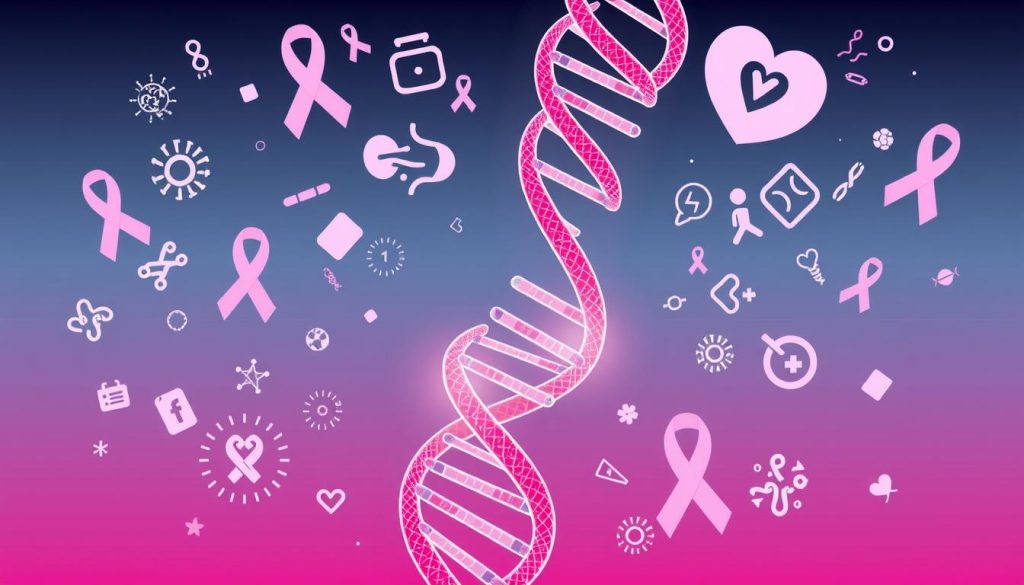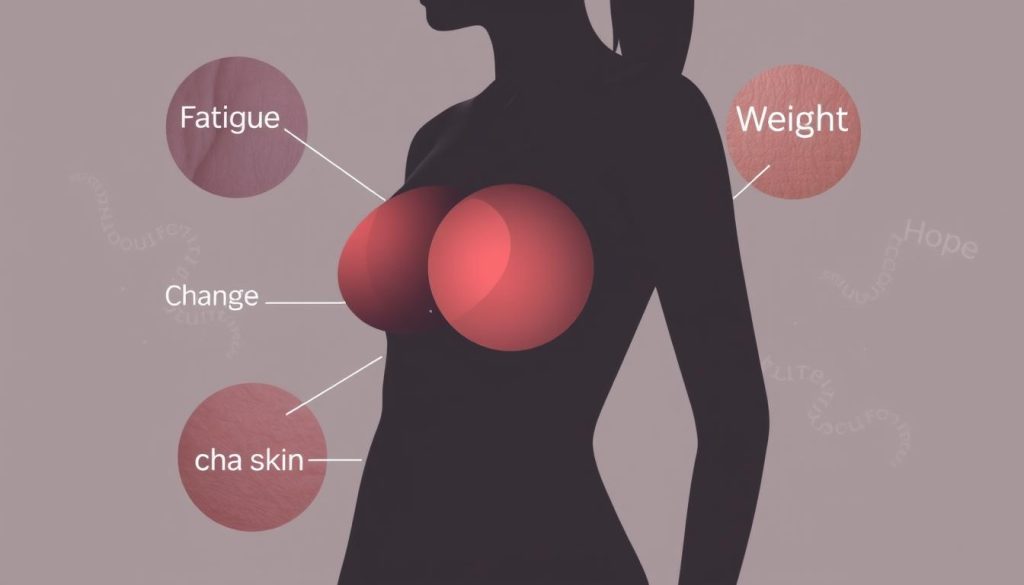Breast cancer touches millions of lives yearly, but not all types are the same. Triple negative breast cancer (TNBC) is a unique and tough subtype. This guide explores TNBC, its causes, and current treatments. TNBC is called so because it lacks three common receptors found in other breast cancers. This makes it harder to treat, as many therapies don’t work. But, new treatments are being developed to fight TNBC.
We’ll cover everything from risk factors to the latest therapies for triple negative breast cancer. This guide is for patients, caregivers, and anyone interested in TNBC. It aims to give you important info about TNBC.
Understanding Triple Negative Breast Cancer
Triple Negative Breast Cancer (TNBC) is a tough form of breast cancer. This section will look into its main traits, how it’s different from other cancers, and how common it is.
Definition and Basic Characteristics
TNBC is special because it lacks receptors for estrogen, progesterone, and HER2 protein. This makes it hard to treat, as it doesn’t react to hormonal or HER2-targeted drugs.
How TNBC Differs from Other Breast Cancers
TNBC grows and spreads quickly, making it aggressive. It’s often called basal-like breast cancer. This means it shares genetic traits with basal cells in the breast ducts.
Prevalence and Risk Statistics
TNBC makes up about 10-15% of all breast cancers. It’s more common in:
- Younger women (under 40)
- Black and Hispanic women
- Women with BRCA1 gene mutations
The risk of metastatic breast cancer is higher in TNBC patients, mainly in the first few years after diagnosis. Early detection and quick treatment are key to better outcomes.
| Characteristic | TNBC | Other Breast Cancers |
|---|---|---|
| Hormone Receptors | Negative | Often Positive |
| HER2 Status | Negative | Can be Positive |
| Growth Rate | Faster | Usually Slower |
| Metastasis Risk | Higher | Lower |
Risk Factors for Developing TNBC
Knowing the risk factors for Triple Negative Breast Cancer (TNBC) is key for catching it early. These include genetics and lifestyle choices.
Genetic Predisposition and BRCA Mutations
BRCA mutations are a big deal for TNBC risk. Women with BRCA1 mutations are at a higher risk. It’s smart to get genetic tests if you have a family history of breast cancer.

Age and Demographic Factors
TNBC often hits younger women. African American and Hispanic women are more likely to get it. Here are age-related risk factors:
- Women under 40
- Premenopausal status
- Late onset of menopause
Lifestyle and Environmental Influences
Some lifestyle choices can raise TNBC risk. These include:
- Obesity
- Lack of physical activity
- High alcohol consumption
- Smoking
Exposure to certain chemicals or radiation can also up the risk. Staying healthy and knowing these risks can help prevent and catch TNBC early.
Early Detection and Diagnosis Methods
Early detection is key in managing Triple Negative Breast Cancer (TNBC). Finding breast cancer early can greatly improve treatment results. It’s important for both high-risk individuals and the general public to get regular TNBC screenings.
Mammograms are the top choice for breast cancer screening. They use X-rays to spot tumors early. Women with dense breasts might need ultrasound or MRI too.
Clinical breast exams by doctors add to self-exams at home. These exams can find changes in breast tissue that need more checking.
When something unusual is found, doctors use different tools to diagnose:
- Biopsy: A small tissue sample is taken for detailed look
- Genetic testing: Finds BRCA mutations linked to TNBC
- Imaging studies: CT scans or PET scans to see if cancer has spread
Screening for TNBC often uses a mix of these methods. The process usually starts with imaging and might include more detailed tests if needed. Regular screenings can lead to better treatment and survival chances for TNBC patients.
Common Symptoms and Warning Signs
Spotting TNBC symptoms and breast cancer warning signs early is key. Knowing physical changes and when to see a doctor is vital. This helps in catching the disease early.
Physical Changes to Watch For
TNBC symptoms show up as physical changes in the breast or nearby areas. Look out for:
- A new lump or thickening in the breast or underarm
- Changes in breast size, shape, or appearance
- Skin dimpling or puckering on the breast
- Nipple changes, including inversion or discharge
- Redness, scaliness, or swelling of the breast skin

When to Seek Medical Attention
If you see any breast cancer warning signs, act fast. See your healthcare provider if you notice:
- Persistent breast pain or discomfort
- Any new or unusual breast changes
- Symptoms that don’t improve within a few weeks
Diagnostic Process Overview
The journey to diagnose TNBC includes several steps:
| Step | Description |
|---|---|
| Clinical Breast Exam | Physical examination by a healthcare professional |
| Imaging Tests | Mammogram, ultrasound, or MRI to visualize breast tissue |
| Biopsy | Tissue sample collection for laboratory analysis |
| Pathology Report | Detailed analysis of biopsy results, including hormone receptor status |
Early detection of TNBC symptoms can lead to better treatment options. Stay alert to your breast health. Don’t hesitate to talk to your doctor if you have concerns.
Staging and Prognosis of TNBC
Breast cancer staging is key in figuring out how far Triple Negative Breast Cancer (TNBC) has spread. Doctors use the TNM system to check the tumor size, if lymph nodes are involved, and if cancer has spread. This helps them classify TNBC into stages 0 through IV.
Stage 0 means the cancer is non-invasive. Stage IV is the most advanced. The stage of TNBC greatly affects how well a person will do. Early diagnosis often leads to better results, with a 91% five-year survival rate for stage I. But, more advanced stages are harder to treat.
| TNBC Stage | 5-Year Survival Rate |
|---|---|
| Stage I | 91% |
| Stage II | 65% |
| Stage III | 41% |
| Stage IV | 11% |
Remember, these numbers are averages. Outcomes can vary a lot. Things like age, overall health, and how well treatment works also play a big role. Getting regular check-ups and catching cancer early are very important for better outcomes with TNBC.
Standard Treatment Approaches for TNBC
TNBC treatment is tailored to fight this aggressive breast cancer. Doctors mix different methods to help patients recover. This approach is designed to give the best chance at beating the disease.

Surgery Options
Breast cancer surgery is often the first step. Surgeons might do a lumpectomy to remove the tumor and save breast tissue. For bigger tumors, a mastectomy is needed.
Some patients choose reconstruction to restore their breast’s look after surgery.
Chemotherapy Protocols
Chemotherapy is key in fighting TNBC. Doctors give a mix of drugs to attack cancer cells. These treatments can be before surgery to shrink tumors or after to kill any left.
The plan depends on the cancer’s stage and the patient’s health.
Radiation Therapy Guidelines
Many TNBC patients get radiation therapy after surgery. It uses high-energy beams to kill any cancer cells left. Radiation sessions last several weeks.
The therapy focuses on the area where the tumor was removed. This helps lower the risk of cancer coming back.
Every TNBC treatment plan is unique. Doctors work with patients to pick the best options. Regular check-ups and scans help track progress and adjust treatments as needed.
Advanced Treatment Options
The battle against triple-negative breast cancer (TNBC) has made great strides with new treatments. These cutting-edge methods are changing how doctors fight this tough form of breast cancer.
Targeted therapy is leading the way in these advances. It’s different from old chemotherapy because it targets cancer cells directly. This means less harm to healthy cells, which can lead to fewer side effects and a better life during treatment for TNBC patients.
PARP inhibitors are also making a big difference for some TNBC patients. These drugs stop a protein that helps cancer cells fix their DNA. This makes it harder for tumor cells to grow and survive. They’re most promising for those with BRCA gene mutations.
Immunotherapy is another promising area in TNBC treatment. It helps the body’s immune system fight cancer better. It teaches the immune system to spot and attack cancer cells. Early signs are good, with some patients seeing longer-lasting remissions.
- Targeted therapy: Focuses on specific cancer cells
- PARP inhibitors: Block DNA repair in cancer cells
- Immunotherapy: Enhances the body’s natural defenses
These new treatments bring hope to TNBC patients. As research keeps going, the outlook for those with this tough breast cancer keeps getting better. Patients should talk to their doctors about these options to find the best treatment for them.
Emerging Therapies and Clinical Trials
The fight against Triple Negative Breast Cancer (TNBC) is getting stronger. Scientists are finding new ways to treat it through clinical trials. This gives hope to patients and their families.
PARP Inhibitors
PARP inhibitors are showing great promise for TNBC patients with BRCA mutations. These drugs block cancer cells’ DNA repair, making them weak against chemotherapy.
| PARP Inhibitor | Approved for | Effectiveness |
|---|---|---|
| Olaparib | BRCA-mutated TNBC | Improved progression-free survival |
| Talazoparib | BRCA-mutated TNBC | Increased overall response rate |
Immunotherapy Developments
Immunotherapy is a new way to treat TNBC. It boosts the body’s immune system to fight cancer. Recent trials with immune checkpoint inhibitors have shown good results.

Targeted Treatment Research
Research is finding new targets for TNBC treatment. Scientists are looking at drugs that target specific proteins or genetic mutations in TNBC cells. These targeted therapies aim to offer better and less toxic treatments.
As TNBC clinical trials keep growing, patients get more chances to try new treatments. These emerging therapies bring new hope in the fight against this aggressive breast cancer.
Managing Side Effects During Treatment
TNBC treatment often deals with side effects of breast cancer. Patients face symptoms that affect their daily life. It’s key to understand and manage these effects for a better life during treatment.
Common side effects include fatigue, nausea, hair loss, and changes in appetite. Patients might also see skin reactions, mood swings, and cognitive issues. It’s vital to talk about these symptoms with your healthcare team.
Here are some ways to cope with breast cancer side effects:
- Rest when needed and maintain a balanced sleep schedule
- Eat small, frequent meals to combat nausea
- Stay hydrated and maintain a nutritious diet
- Use gentle skin care products to soothe irritated skin
- Practice relaxation techniques like meditation or deep breathing
Your doctor may give medications to help with side effects. They might also suggest therapies like acupuncture or massage. Remember, what works for one person might not work for another.
| Side Effect | Management Strategy |
|---|---|
| Fatigue | Regular light exercise, proper sleep hygiene |
| Nausea | Anti-nausea medications, ginger tea |
| Hair loss | Scalp cooling treatments, wigs or head coverings |
| Skin changes | Moisturizing, avoiding harsh soaps |
Managing TNBC treatment means tackling both physical and emotional side effects. Support groups and counseling offer emotional support. By working with your healthcare team, you can create a plan to manage side effects and improve your well-being during treatment.
Lifestyle Changes and Supportive Care
Making positive lifestyle changes and getting supportive care are key for those with triple-negative breast cancer. These steps can help improve treatment results and overall health.
Nutrition Guidelines
Eating right is important for recovery and staying healthy. A diet full of fruits, vegetables, and whole grains is best. Try to cut down on processed foods, red meat, and alcohol too.

| Food Group | Recommended Servings | Benefits |
|---|---|---|
| Fruits and Vegetables | 5-9 per day | Antioxidants, fiber, vitamins |
| Whole Grains | 3-6 per day | Fiber, B vitamins, minerals |
| Lean Proteins | 2-3 per day | Muscle repair, immune support |
Exercise Recommendations
Staying active boosts energy and mood. Aim for 150 minutes of moderate or 75 minutes of vigorous exercise each week. Choose activities like walking, swimming, or yoga that fit your fitness level.
Stress Management Techniques
Managing stress is a big part of supportive care. It’s vital for both mental and physical health. Try meditation, deep breathing, or joining support groups to lower anxiety and enhance life quality during treatment and recovery.
- Practice mindfulness meditation for 10-15 minutes daily
- Try progressive muscle relaxation before bed
- Connect with others through support groups or counseling
Recovery and Follow-up Care
After finishing TNBC treatment, patients start a vital recovery and care phase. This includes physical healing, emotional adjustment, and watching for health changes. It’s key to catch any signs of cancer coming back early.
At first, patients might feel tired, in pain, and have mood swings. It’s vital to let your body heal and seek help when needed. Many find solace in support groups or counseling for breast cancer survivors.
Follow-up care includes:
- Regular check-ups with your oncologist
- Mammograms and other imaging tests
- Blood tests to monitor overall health
- Physical exams to check for any new symptoms
Your doctor will make a follow-up plan just for you. This plan might change as you get better. It’s important to go to all your appointments and tell your doctor about any new symptoms right away.
Keeping a healthy lifestyle is important for TNBC recovery. Eat well, exercise regularly, and manage stress. Some survivors say making healthy choices helps them feel in control of their health.
Remember, every TNBC survivor’s path is different. Be kind to yourself and celebrate each step in your recovery. With the right care and attention, many TNBC survivors live happy, healthy lives after treatment.
Prevention Strategies and Risk Reduction
We can’t control all risks for Triple Negative Breast Cancer (TNBC), but we can take steps to lower our chances. A healthy lifestyle is essential for TNBC prevention. Eat a balanced diet with lots of fruits, veggies, and whole grains. Try to avoid processed foods and limit alcohol.
Regular exercise is also key in reducing breast cancer risk. Aim for 150 minutes of moderate activity or 75 minutes of vigorous activity weekly. Activities like brisk walking, swimming, or cycling are great. Being active helps keep a healthy weight, which is important as obesity increases TNBC risk.
If you have a family history of breast cancer or genetic mutations like BRCA1, talk to your doctor about preventive options. These might include more frequent screenings or preventive surgeries. Remember, early detection through self-exams and mammograms is powerful in fighting breast cancer, including TNBC.
FAQ
Q: What is triple negative breast cancer (TNBC)?
A: Triple negative breast cancer is a type of breast cancer. It doesn’t have estrogen, progesterone, or HER2 receptors. This makes it hard to treat because it doesn’t respond to certain therapies.
Q: How common is TNBC?
A: TNBC makes up about 10-15% of all breast cancers. It’s more aggressive and common in younger women and African Americans. It’s also more common in those with BRCA1 gene mutations.
Q: What are the risk factors for developing TNBC?
A: Risk factors include BRCA1 gene mutations and being under 40. African American or Hispanic ethnicity and obesity also increase risk. But, many women with TNBC have no known risk factors.
Q: How is TNBC diagnosed?
A: Doctors use imaging tests like mammograms and biopsies to diagnose TNBC. The biopsy shows the cancer cells don’t have estrogen, progesterone, or HER2 receptors.
Q: What are the treatment options for TNBC?
A: Treatments include surgery, chemotherapy, and radiation. Advanced options include targeted therapies like PARP inhibitors and immunotherapy. Clinical trials for new treatments are also available.
Q: Is TNBC curable?
A: Yes, TNBC can be curable, even aggressive, if caught early. The chance of survival depends on the cancer’s stage and how well it responds to treatment.
Q: What is the survival rate for TNBC?
A: Survival rates vary by stage. For early-stage TNBC, the 5-year survival rate is about 91%. But, for metastatic TNBC, it’s much lower, around 12%.
Q: Are there any promising new treatments for TNBC?
A: Yes, new treatments are being developed. These include immunotherapies, antibody-drug conjugates, and combinations of existing therapies. PARP inhibitors are also showing promise for those with BRCA mutations.
Q: Can lifestyle changes help prevent TNBC?
A: While no guaranteed prevention exists, a healthy lifestyle can help. Maintaining a healthy weight, exercising regularly, limiting alcohol, and breastfeeding may reduce breast cancer risk.
Q: What should I expect during recovery from TNBC treatment?
A: Recovery varies but may include managing side effects and follow-up appointments. Supportive care like nutrition advice, exercise, and mental health support can help.

















